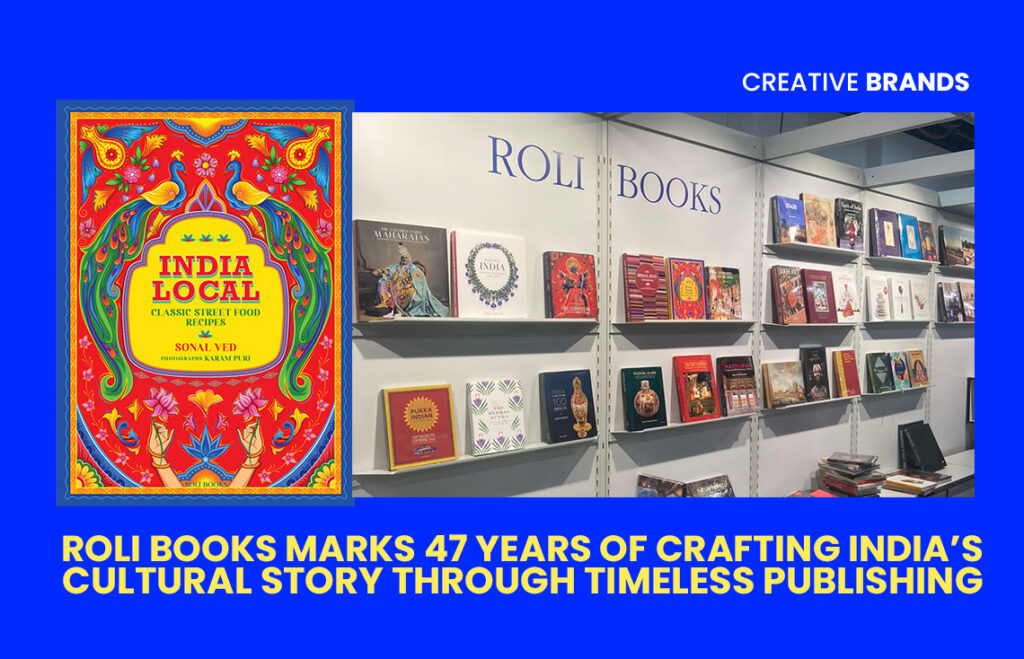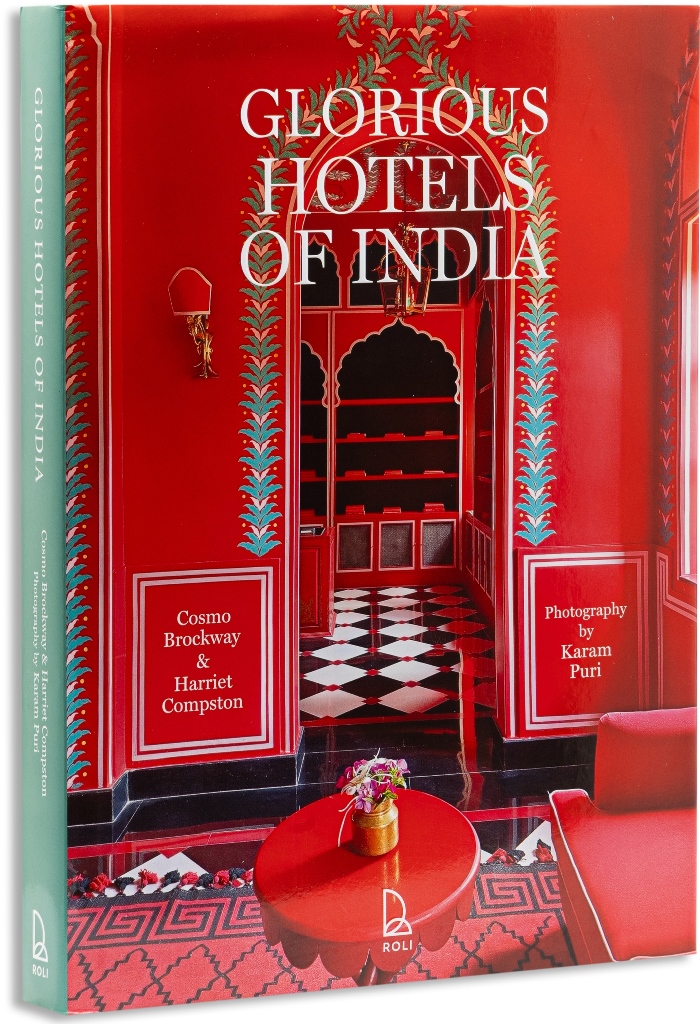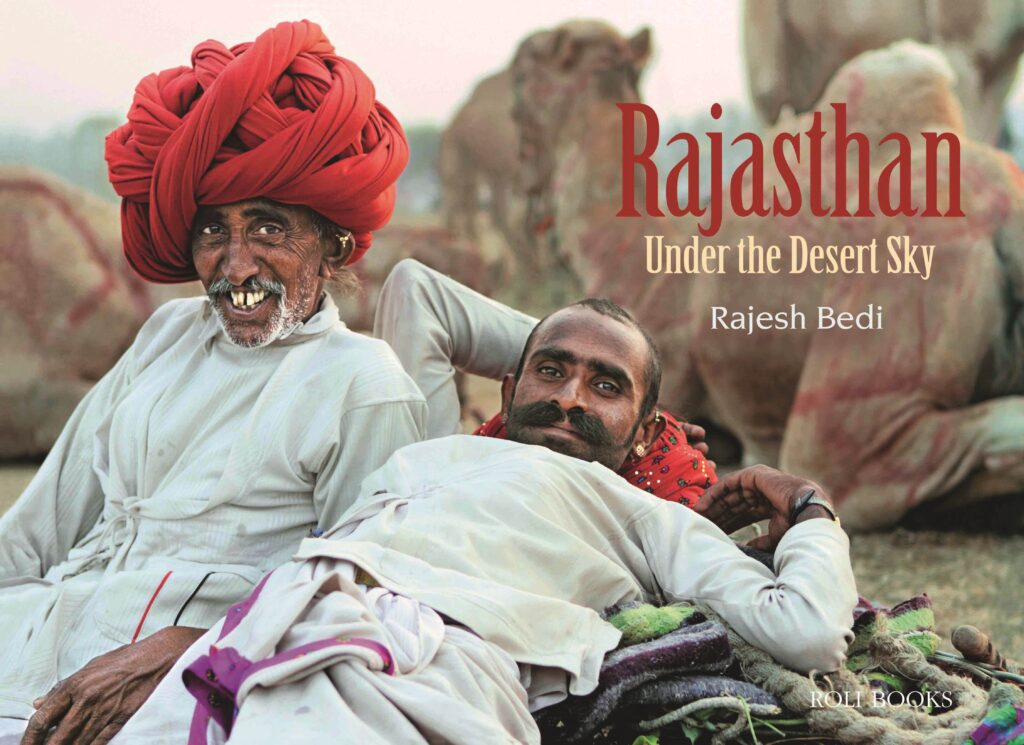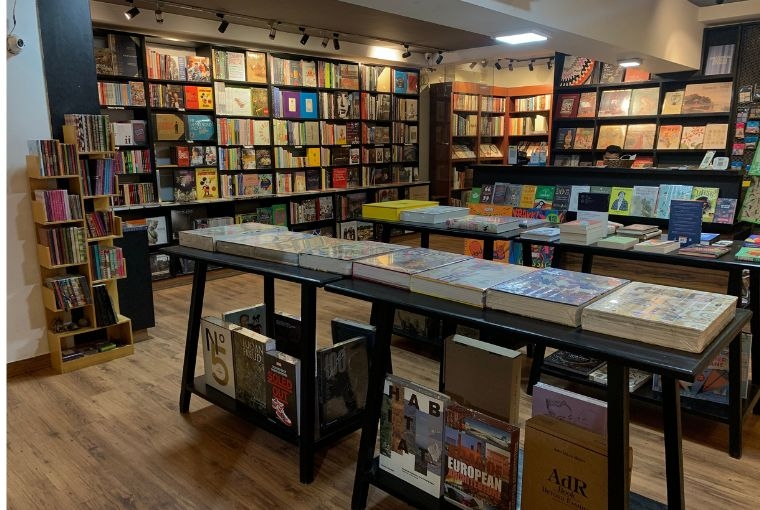Roli Books celebrates 47 years of championing India’s cultural, artistic and historical narratives through beautifully crafted publications. Known for its high-quality design, expert collaborations and passion-driven independence, the publisher continues to honour print as an art form while embracing new voices, innovative products and global audiences rooted in India’s rich heritage.

Roli Books marked its forty-seventh anniversary with a sentiment that felt less like a corporate milestone and more like an intimate celebration of a long, evolving relationship—one shaped by authors, photographers, designers, editors, readers and the countless stories that have filled its pages for nearly half a century. The tribute, expressed in a message of gratitude, captured the foundational spirit that has guided the independent publishing house since its inception: a belief that books must be labours of love, that ideas deserve time and craftsmanship, and that publishing is ultimately a collective art. “Thank you to every author, photographer, colleague and reader who has been part of our story,” the company said, acknowledging the people whose passion, imagination and trust “fuel everything we do.” The message ended with a promise—to embrace new ideas, new voices and continue building on its tradition of publishing excellence.

From the moment Roli Books was founded, it charted a path that defied many of the conventions of commercial publishing. Instead of chasing trends or rapid growth, it focused on niche yet deeply meaningful themes that highlighted India’s cultural, artistic and historical richness. These choices, bold at the time, laid the foundation for a catalogue that would eventually travel far beyond India’s borders. Over forty-seven years, the company’s books—carefully curated, impeccably designed and enriched by expert scholarship—found their place not only in homes but also in some of the most respected bookstores, museums and galleries across the world. Roli carved out a space where serious research could coexist with visual beauty, where academic depth met accessibility, and where India’s heritage could be celebrated without being simplified.
Roli Books’ philosophy was always rooted in a single conviction: that India, with its long and layered past, its evolving identities and its diverse expressions, offered an inexhaustible well of stories that deserved to be documented with integrity. Whether it was a lens turned toward the country’s architectural splendours, a culinary journey capturing culinary traditions, or intimate portraits of communities and crafts on the verge of disappearing, each book sought to preserve something fragile, something fleeting, something historic or artistic that needed to be recorded before it slipped away. To ensure these stories were told with authenticity, the publishing house worked closely with some of India’s finest creative minds—photographers whose work redefined visual narratives, historians who brought nuance to familiar subjects, cultural experts who made complex themes accessible, and writers whose voices shaped public understanding of India’s heritage.

Throughout its journey, innovation was not a buzzword at Roli Books but a natural byproduct of its passion-driven approach. The company embraced design at a time when Indian publishing was still dominated by utilitarian aesthetics. Each Roli title was conceptualised to be not just a book but a treasure in itself—a keepsake that combined research with artistic sensibility. Binding, paper selection, layout, illustration, typography—every element was thoughtfully chosen to enhance the reader’s experience. This meticulous attention to detail helped Roli Books earn a reputation for excellence both in India and internationally, where collectors, travellers, scholars and art lovers came to recognise the distinctive quality associated with the brand.
Even as the publishing world underwent dramatic changes—digital disruption, shifting reading habits, new formats—Roli Books remained consistent in its belief in the physical beauty and permanence of print. But this did not mean it resisted evolution. On the contrary, the company found new pathways to keep the tactile charm of books alive in an age dominated by screens. It ventured into designing and producing high-quality gift and stationery products, expanding its creative canvas while staying true to its aesthetic sensibilities. These included notebooks, journals, art prints, calendars and other items that reflected the same craftsmanship found in their books. The products resonated with a generation that cherished design, purpose and story-driven objects.
This expansion gave rise to CMYK, Roli Books’ own concept stores—spaces that became much more than retail outlets. CMYK grew into cultural curations of their own, presenting carefully selected books, stationery and design objects from India and around the world. These stores became meeting points for literature enthusiasts, design thinkers and curious minds—an embodiment of Roli’s belief that books are not merely commodities but experiences. For many, CMYK represents a sanctuary for browsing, discovery and conversation, offering a refreshing contrast to algorithm-driven digital recommendations.
One of Roli’s defining characteristics through the decades has been its choice to remain a mid-sized, independent publishing house. In an industry increasingly dominated by large multinational corporations, this decision was intentional and deeply tied to its core values. The smaller scale allowed the team to pursue projects driven not by market compulsions but by passion. With this independence came agility—the ability to take creative risks, to invest in unconventional themes, to collaborate deeply with authors and artists, and to publish books that might not immediately promise commercial success but carried enduring cultural value. The company’s team, described as small but dedicated, found meaning not in volume but in the impact of their work.
This approach also allowed Roli Books to straddle tradition and modernity with rare finesse. Its publications carried the substance of academic expertise without becoming inaccessible to general readers. They maintained respect for heritage without romanticising it. They embraced contemporary design while honouring timeless craftsmanship. This balance helped the company appeal to multiple generations—older readers who valued the preservation of cultural knowledge, and younger ones drawn to aesthetics, storytelling and authenticity.
As Roli Books celebrates its forty-seventh year, its leadership remains focused on the future—one filled with opportunities for storytelling, creativity and new collaborations. Priya Kapoor, Publisher at Roli Books, reflected on this journey with a sentiment that echoed the company’s founding philosophy. “At ROLI, we believe stories don’t just inform—they connect, inspire, and travel across cultures,” she said, emphasising the role of narrative in shaping understanding and imagination. For nearly five decades, she noted, the publishing house has championed India’s art, photography, food and cultural heritage through books “crafted with care and creativity.”
Her words serve as a reminder that even as the world becomes more digital and fast-paced, there remains a deep human need for stories that offer depth, presence and emotional resonance. Books, when created with intention and artistry, can be objects of desire—something Roli Books has always believed in. In a world that often reduces stories to fleeting content, Roli’s work stands as a testament to the power of publishing that honours both history and craft.
For those who share this belief and dream of working with stories in a tangible form, Roli Books extended an invitation: “If you are a passionate individual who believes that books are objects of desire, that paper is not obsolete, and that you want to be a part of the Roli story, this is your opportunity.” The statement reflects not just a call for talent but a philosophy that defines Roli’s identity. The company is not simply looking for employees—it is looking for collaborators, individuals who see books not as products but as artistic and cultural expressions.
This spirit of collaboration has been central to Roli’s evolution. Over the years, its authors and photographers have often described their relationship with the publishing house as familial rather than transactional. Projects were nurtured with patience, dialogue and mutual respect. Many of Roli’s titles involved years of research, extensive travel, archival work and creative experimentation—possible only in an environment that valued depth over speed. These collaborations produced some of the most iconic books that documented India’s history, architecture, culinary traditions, textile legacies, visual arts and more. They helped shape the cultural memory of generations of readers both within and outside India.

Roli’s influence has also extended into institutions that preserve and interpret culture. Museums, galleries and cultural foundations have frequently partnered with the company to produce catalogues, monographs and special editions. These partnerships ensured that important exhibitions and cultural moments had lasting documentation. The books served as both scholarly resources and beautifully crafted artefacts that could stand alone, independent of the events they accompanied.
As the publishing landscape continues to shift, Roli Books remains committed to adapting while holding on to what makes it distinctive. Its future plans involve deepening its engagement with contemporary voices, expanding its design-driven product lines, and strengthening its presence in global markets. At a time when many pressing conversations—about identity, heritage, environment, art and community—are shaping public discourse, the company sees itself playing an important role in amplifying perspectives that are insightful, original and rooted in the Indian experience.
The milestone of forty-seven years is therefore not just a celebration of the past but a reaffirmation of purpose. It is a recognition of everything that has been built—the catalogue, the collaborations, the design ethos, the trust of readers—and a reminder of the responsibility that comes with such a legacy. Publishing, after all, is as much about preserving stories as it is about discovering new ones. Roli Books stands at this intersection, looking ahead with the same curiosity and passion that defined its early years.
In many ways, the company’s journey mirrors the evolution of Indian publishing itself. When Roli began, the industry was considerably smaller, with limited resources and few platforms for creative experimentation. Over the decades, as India’s cultural confidence grew and global interest in its stories expanded, Roli’s books provided some of the most compelling windows into the country’s artistic and historical universe. As independent publishing became more challenging in the face of corporate consolidation, Roli’s resilience offered a model of sustainability rooted in quality, innovation and strong creative partnerships.
What stands out most across this forty-seven-year journey is the sense of continuity—of values preserved, of traditions upheld and of a mission that has remained unchanged even as formats, technologies and markets evolved. The company’s publishing choices form a mosaic of India’s cultural narratives, each book capturing a piece of the country’s heritage. They tell stories not just through words but through images, textures, designs and the careful curatorial work that goes into each title. To hold a Roli book is often to encounter an object that carries within it a craftsperson’s dedication, a scholar’s expertise and an artist’s eye.
This dedication also extends to the readers who have supported Roli Books through the decades. Readers who, in an age of rapid consumption, have chosen to spend time with books that invite reflection and appreciation. Readers who believe that the turning of a page has a tactile magic that cannot be replicated by a digital swipe. Readers who recognise that stories rooted in culture help anchor identity in an ever-changing world. For Roli, this community represents its greatest asset and the reason it continues to innovate and grow.
As the anniversary celebrations unfold, the mood is one of gratitude but also anticipation. Gratitude for the collaborations and stories that shaped the last forty-seven years. And anticipation for the new voices, new ideas and new creative journeys that will define the decades to come. Roli Books has never been content with resting on legacy alone; its identity has always been driven by the desire to push boundaries while staying true to its roots.
Nearly five decades after its founding, the essence of Roli Books remains unchanged: a commitment to storytelling that celebrates India, a belief in the enduring beauty of print, and a dedication to creating objects of art that carry meaning across generations. As it steps into its next chapter, the publishing house continues to stand as a reminder that stories, when crafted with care and imagination, do far more than inform. They connect people, spark curiosity, preserve memory and travel effortlessly across cultures—fulfilling the timeless mission that Priya Kapoor so simply and eloquently described.

Discover more from Creative Brands
Subscribe to get the latest posts sent to your email.






